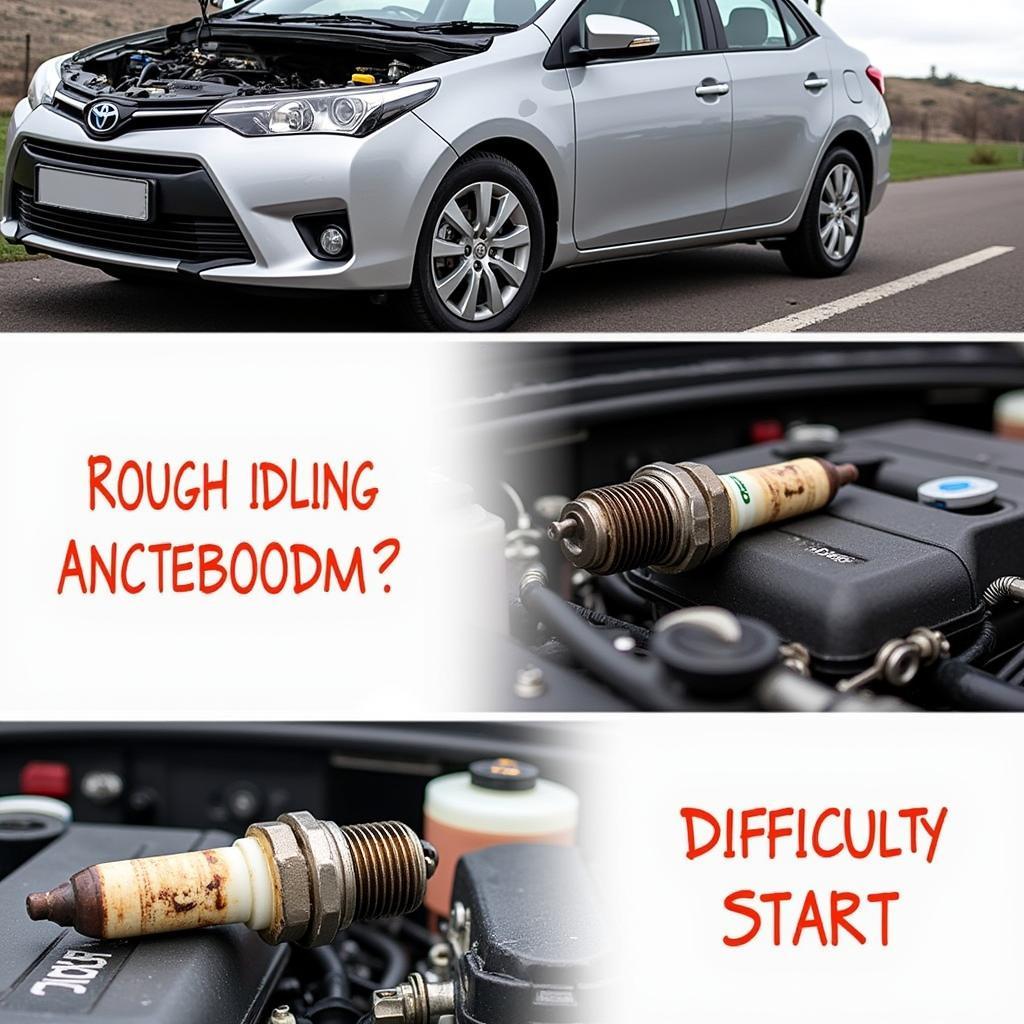Car Spark Plugs Problems can cause a range of issues, from reduced fuel efficiency to complete engine failure. Understanding the symptoms, causes, and solutions for these problems is crucial for maintaining your vehicle’s performance and longevity. This article will delve into common car spark plug issues, offering practical advice for car owners, repair shops, and technicians.
Recognizing the Signs of Faulty Spark Plugs
A variety of symptoms can indicate a problem with your car’s spark plugs. Recognizing these signs early can prevent more significant issues down the road. Common symptoms include rough idling, engine misfires, difficulty starting, reduced fuel economy, and lack of acceleration. You might also notice a noticeable increase in exhaust emissions.
 Common Faulty Spark Plug Symptoms
Common Faulty Spark Plug Symptoms
Common Car Spark Plugs Problems
Several factors can contribute to car spark plugs problems. These range from normal wear and tear to more complex issues related to the engine’s operating environment. Fouling, which is the accumulation of deposits on the spark plug electrode, is a common culprit. This can be caused by oil leaks, a rich fuel mixture, or burning coolant. Another frequent issue is worn electrodes, which naturally erode over time, affecting the spark plug’s ability to ignite the air-fuel mixture. Damaged insulation can also lead to misfires and reduced engine performance.
Diagnosing Car Spark Plugs Problems
Diagnosing car spark plugs problems often involves a visual inspection of the spark plugs. Remove the spark plugs and look for signs of fouling, wear, or damage. The color of the deposits on the spark plug can also provide clues about the underlying issue. For example, black deposits may indicate a rich fuel mixture, while white deposits could suggest a lean mixture or overheating.
car won’t start spark plugs problems
How to Fix Car Spark Plugs Problems
The solution to car spark plugs problems often involves replacing the faulty spark plugs. However, depending on the underlying cause, other repairs may be necessary. For example, if fouling is due to an oil leak, the leak must be addressed before replacing the spark plugs. Similarly, if a rich fuel mixture is the cause, the fuel system may need to be adjusted.
Preventing Future Spark Plug Issues
Preventing future spark plug issues requires regular maintenance and attention to your vehicle’s overall health. Ensure your engine is properly tuned and that the fuel system is functioning correctly. Using the correct type of spark plugs for your vehicle is also essential. Consult your owner’s manual for recommendations.
car problems associated with spark plugs
What causes spark plug problems?
A variety of factors can cause spark plug problems, including fouling, worn electrodes, damaged insulation, and incorrect gap.
How often should I replace my spark plugs?
Consult your owner’s manual for the recommended replacement interval. Generally, spark plugs should be replaced every 30,000 to 100,000 miles.
“Regularly checking and replacing your spark plugs is a small investment that can save you from major engine problems down the line,” says John Smith, a certified automotive technician with over 20 years of experience.
Can bad spark plugs damage my engine?
Yes, faulty spark plugs can lead to reduced fuel efficiency, increased emissions, and even engine damage if left unaddressed.
diagnosing car problems using spark plugs
Conclusion
Car spark plugs problems can significantly impact your vehicle’s performance and reliability. By understanding the common symptoms, causes, and solutions, you can maintain your car’s optimal health and avoid costly repairs. For expert advice or assistance with your car’s spark plug issues, connect with us at AutoTipPro. Call us at +1 (641) 206-8880 or visit our office at 500 N St Mary’s St, San Antonio, TX 78205, United States.
“Addressing spark plug issues promptly not only improves performance but also contributes to a cleaner environment by reducing emissions,” adds Jane Doe, an automotive engineer specializing in engine performance.
FAQ
- What are the signs of bad spark plugs? Common signs include rough idling, misfires, difficulty starting, and reduced fuel economy.
- How do I diagnose car spark plugs problems? A visual inspection of the spark plugs is often the first step in diagnosis.
- How do I fix car spark plugs problems? Replacing the faulty spark plugs is the most common solution.
- How can I prevent future spark plug problems? Regular maintenance and using the correct type of spark plugs are crucial.
- What happens if I don’t replace bad spark plugs? Ignoring bad spark plugs can lead to further engine problems and reduced fuel efficiency.
- How much does it cost to replace spark plugs? The cost varies depending on the vehicle and the type of spark plugs used.
- Can I replace spark plugs myself? Yes, with the right tools and knowledge, it is possible to replace spark plugs yourself.




Leave a Reply